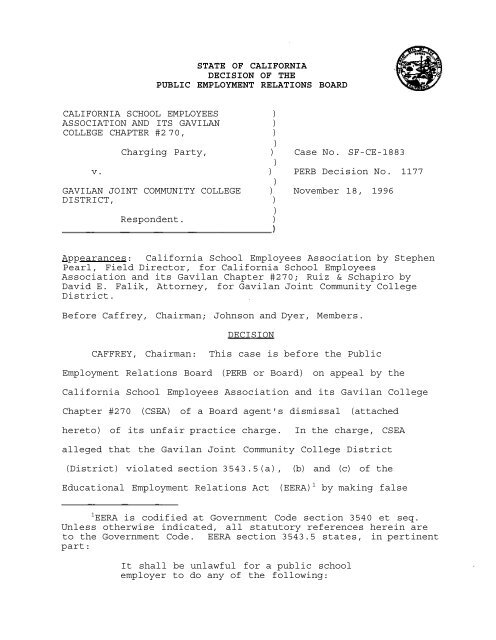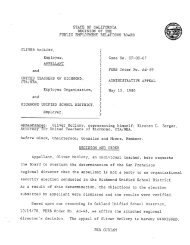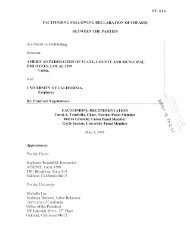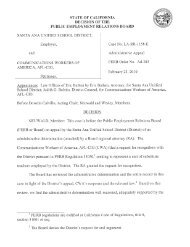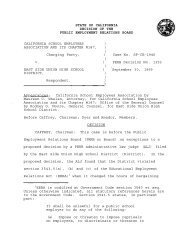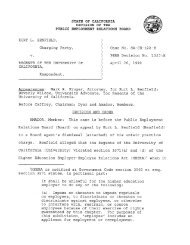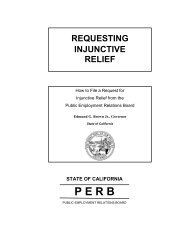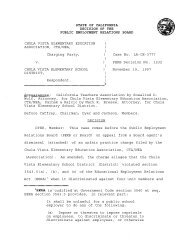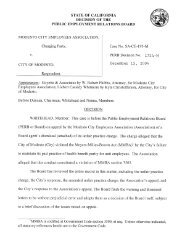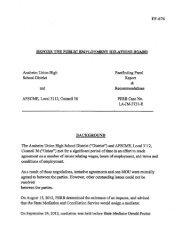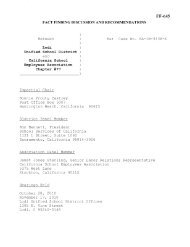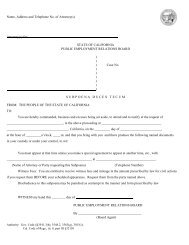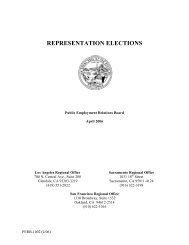state of california decision of the public employment relations board ...
state of california decision of the public employment relations board ...
state of california decision of the public employment relations board ...
Create successful ePaper yourself
Turn your PDF publications into a flip-book with our unique Google optimized e-Paper software.
STATE OF CALIFORNIA<br />
DECISION OF THE<br />
PUBLIC EMPLOYMENT RELATIONS BOARD<br />
CALIFORNIA SCHOOL EMPLOYEES )<br />
ASSOCIATION AND ITS GAVILAN )<br />
COLLEGE CHAPTER #2 70, )<br />
Charging Party,<br />
)<br />
) Case No. SF-CE-1883<br />
)<br />
v. ) PERB Decision No. 1177<br />
)<br />
GAVILAN JOINT COMMUNITY COLLEGE<br />
DISTRICT,<br />
)<br />
)<br />
November 18, 1996<br />
Respondent.<br />
)<br />
)<br />
Appearances: California School Employees Association by Stephen<br />
Pearl, Field Director, for California School Employees<br />
Association and its Gavilan Chapter #270; Ruiz & Schapiro by<br />
David E. Falik, Attorney, for Gavilan Joint Community College<br />
District.<br />
Before Caffrey, Chairman; Johnson and Dyer, Members.<br />
DECISION<br />
CAFFREY, Chairman:<br />
This case is before <strong>the</strong> Public<br />
Employment Relations Board (PERB or Board) on appeal by <strong>the</strong><br />
California School Employees Association and its Gavilan College<br />
Chapter #270 (CSEA) <strong>of</strong> a Board agent's dismissal (attached<br />
hereto) <strong>of</strong> its unfair practice charge.<br />
In <strong>the</strong> charge, CSEA<br />
alleged that <strong>the</strong> Gavilan Joint Community College District<br />
(District) violated section 3543.5(a), (b) and (c) <strong>of</strong> <strong>the</strong><br />
Educational Employment Relations Act (EERA) 1<br />
by making false<br />
1 EERA is codified at Government Code section 3540 et seq.<br />
Unless o<strong>the</strong>rwise indicated, all statutory references herein are<br />
to <strong>the</strong> Government Code. EERA section 3543.5 <strong>state</strong>s, in pertinent<br />
part:<br />
It shall be unlawful for a <strong>public</strong> school<br />
employer to do any <strong>of</strong> <strong>the</strong> following:
<strong>state</strong>ments and misrepresentations during negotiations.<br />
The Board has reviewed <strong>the</strong> entire record in this case,<br />
including CSEA's original and amended unfair practice charge, <strong>the</strong><br />
Board agent's warning and dismissal letters, CSEA's appeal and<br />
<strong>the</strong> District's response <strong>the</strong>reto.<br />
The Board finds <strong>the</strong> warning and<br />
dismissal letters to be free <strong>of</strong> prejudicial error and adopts <strong>the</strong>m<br />
as <strong>the</strong> <strong>decision</strong> <strong>of</strong> <strong>the</strong> Board itself in accordance with <strong>the</strong><br />
following discussion.<br />
DISCUSSION<br />
CSEA agreed to <strong>the</strong> elimination <strong>of</strong> a tax-sheltered annuity<br />
and cash back benefit plan (TSA/cash back plan) as part <strong>of</strong> <strong>the</strong><br />
resolution <strong>of</strong> its contract negotiations with <strong>the</strong> District»<br />
CSEA<br />
alleges that it agreed to <strong>the</strong> elimination <strong>of</strong> this plan only<br />
because <strong>the</strong> District represented that <strong>the</strong> plan would also be<br />
eliminated for <strong>the</strong> o<strong>the</strong>r employees <strong>of</strong> <strong>the</strong> District.<br />
CSEA claims<br />
it first learned in January 1996 that <strong>the</strong> District had not<br />
eliminated <strong>the</strong> plan for o<strong>the</strong>r employees.<br />
CSEA charges that <strong>the</strong><br />
District violated its duty to bargain in good faith by making<br />
(a) Impose or threaten to impose reprisals<br />
on employees, to discriminate or threaten to<br />
discriminate against employees, or o<strong>the</strong>rwise<br />
to interfere with, restrain, or coerce<br />
employees because <strong>of</strong> <strong>the</strong>ir exercise <strong>of</strong> rights<br />
guaranteed by this chapter. For purposes <strong>of</strong><br />
this subdivision, "employee" includes an<br />
applicant for <strong>employment</strong> or re<strong>employment</strong>.<br />
(b) Deny to employee organizations rights<br />
guaranteed to <strong>the</strong>m by this chapter.<br />
(c) Refuse or fail to meet and negotiate in<br />
good faith with an exclusive representative.
false <strong>state</strong>ments and misrepresentations during negotiations.<br />
The<br />
Board agent dismissed CSEA's charge for failure to demonstrate a<br />
violation under PERB's "totality <strong>of</strong> <strong>the</strong> conduct" test. 2<br />
CSEA<br />
asserts that <strong>the</strong> District's misrepresentations concerning <strong>the</strong><br />
TSA/cash back plan must be reviewed in <strong>the</strong> total context <strong>of</strong><br />
negotiations, including PERB's findings <strong>of</strong> o<strong>the</strong>r violations by<br />
<strong>the</strong> District.<br />
When viewed in this light, CSEA alleges, "<strong>the</strong><br />
misrepresentation is simply one more example <strong>of</strong> an employer with<br />
a history <strong>of</strong> bad faith bargaining."<br />
Initially, review <strong>of</strong> <strong>the</strong> warning and dismissal letters<br />
leaves it unclear as to whe<strong>the</strong>r CSEA's charge is timely.<br />
limitation period described in EERA section 3541.5(a)(I) 3<br />
The<br />
is<br />
mandatory and serves as a jurisdictional bar to charges filed<br />
outside <strong>the</strong> prescribed period.<br />
(Palm Springs Unified School<br />
2 In considering an allegation that <strong>the</strong>re has been a failure<br />
to bargain in good faith, PERB may review <strong>the</strong> totality <strong>of</strong> <strong>the</strong><br />
bargaining conduct to determine whe<strong>the</strong>r <strong>the</strong>re are sufficient<br />
indicators <strong>of</strong> an intent to frustrate or avoid <strong>the</strong> bargaining<br />
process. (Pajaro Valley Unified School District (1978) PERB<br />
Decision No. 51.) The presence <strong>of</strong> a single indicator <strong>of</strong> bad<br />
faith is generally insufficient to meet <strong>the</strong> "totality <strong>of</strong> <strong>the</strong><br />
conduct" test. (Regents <strong>of</strong> <strong>the</strong> University <strong>of</strong> California (19 85)<br />
PERB Decision No. 520-H.)<br />
3 EERA section 3541.5 <strong>state</strong>s, in pertinent part:<br />
(a) Any employee, employee organization, or<br />
employer shall have <strong>the</strong> right to file an<br />
unfair practice charge, except that <strong>the</strong> <strong>board</strong><br />
shall not do ei<strong>the</strong>r <strong>of</strong> <strong>the</strong> following:<br />
(1) Issue a complaint in respect <strong>of</strong> any<br />
charge based upon an alleged unfair practice<br />
occurring more than six months prior to <strong>the</strong><br />
filing <strong>of</strong> <strong>the</strong> charge.
District (1991) PERB Decision No. 888.)<br />
The Board agent warned<br />
CSEA that its April 8, 1996, charge, which referenced<br />
misrepresentations by <strong>the</strong> District occurring on September 5,<br />
1995, was untimely because no evidence <strong>of</strong> belated discovery had<br />
been provided.<br />
In its amended charge, CSEA asserts that it only<br />
discovered <strong>the</strong> District's misrepresentations in January 1996 when<br />
<strong>the</strong> TSA/cash back plan was first eliminated for bargaining unit<br />
members, but not eliminated for o<strong>the</strong>r employees.<br />
CSEA's assertion that it did not discover <strong>the</strong> District's<br />
alleged misrepresentations until January 1996 is logical.<br />
CSEA<br />
alleges that <strong>the</strong> misrepresentations by <strong>the</strong> District in September<br />
1995 led CSEA to accept <strong>the</strong> factfinding panel report in November<br />
1995, and subsequently agree to a contract which included<br />
elimination <strong>of</strong> <strong>the</strong> TSA/cash back plan.<br />
The District cites<br />
California State Employees' Association (Darzins) (1985) PERB<br />
Decision No. 546-S to point out that discovery <strong>of</strong> <strong>the</strong> legal<br />
significance <strong>of</strong> conduct <strong>of</strong> which a party has knowledge does not<br />
constitute belated discovery for purposes <strong>of</strong> EERA's statute <strong>of</strong><br />
limitations.<br />
However, this fails to address CSEA's logical<br />
assertion that, since it was misled by <strong>the</strong> District in September,<br />
it did not know that <strong>the</strong> District had made misrepresentations at<br />
that time.<br />
The EERA statute <strong>of</strong> limitations begins to run when<br />
<strong>the</strong> charging party knew or should have known <strong>of</strong> <strong>the</strong> alleged<br />
unlawful conduct.<br />
(Fairfield-Suisun Unified School District<br />
(1985) PERB Decision No. 547.) Since CSEA did not know <strong>of</strong> <strong>the</strong><br />
alleged unlawful conduct until January 1996, when it discovered
that <strong>the</strong> TSA/cash back plan had not been eliminated for o<strong>the</strong>r<br />
employees, its April 8, 1996, unfair practice charge is timely.<br />
On <strong>the</strong> merits, CSEA's brief appeal argues that <strong>the</strong><br />
District's misrepresentations, when considered in light <strong>of</strong> <strong>the</strong><br />
previous finding by a PERB administrative law judge (ALJ) that<br />
<strong>the</strong> District engaged in bad faith bargaining and anti-union<br />
animus, is sufficient to demonstrate that <strong>the</strong> District has acted<br />
unlawfully in this case.<br />
In Gavilan Joint Community College District (1996) PERB<br />
Decision No. HO-U-613, a PERB ALJ found that <strong>the</strong> District engaged<br />
in surface bargaining in violation <strong>of</strong> EERA section 3543.5 in its<br />
negotiations with CSEA. In reaching this conclusion <strong>the</strong> ALJ<br />
specifically noted that <strong>the</strong> case addressed whe<strong>the</strong>r <strong>the</strong> District<br />
negotiated in good faith from <strong>the</strong> submission <strong>of</strong> CSEA's initial<br />
bargaining proposal in September 1993 to <strong>the</strong> declaration <strong>of</strong><br />
impasse on July 28, 1994.<br />
CSEA asserts that <strong>the</strong> alleged<br />
misrepresentation is "one more example <strong>of</strong> an employer with a<br />
history <strong>of</strong> bad faith bargaining" and, <strong>the</strong>refore, meets <strong>the</strong><br />
Board's "totality <strong>of</strong> <strong>the</strong> conduct" test when reviewed in light <strong>of</strong><br />
<strong>the</strong> earlier violations.<br />
CSEA's simple reference to <strong>the</strong> earlier case fails to<br />
demonstrate any <strong>relations</strong>hip between <strong>the</strong> conduct addressed by <strong>the</strong><br />
ALJ in PERB Decision No. HO-U-613 and <strong>the</strong> alleged violations in<br />
<strong>the</strong> instant case.<br />
The mere <strong>state</strong>ment <strong>of</strong> <strong>the</strong> fact that <strong>the</strong><br />
District was found to have engaged in surface bargaining more<br />
than a year prior to <strong>the</strong> conduct at issue here does not lend
support to <strong>the</strong> instant unfair practice charge.<br />
Therefore, CSEA's<br />
appeal is without merit.<br />
ORDER<br />
The unfair practice charge in Case No. SF-CE-1883 is hereby<br />
DISMISSED WITHOUT LEAVE TO AMEND.<br />
Member Johnson's concurrence begins on page 7.<br />
Member Dyer's concurrence begins on page 9.
JOHNSON, Member, concurring:<br />
The California School<br />
Employees Association and its Gavilan College Chapter #270 (CSEA)<br />
alleged in its unfair practice charge that it agreed to <strong>the</strong><br />
elimination <strong>of</strong> <strong>the</strong> TSA/cash back plan during negotiations for a<br />
successor agreement because <strong>the</strong> Gavilan Joint Community College<br />
District (District) represented that <strong>the</strong> plan would also be<br />
eliminated for <strong>the</strong> District's o<strong>the</strong>r employees.<br />
However, CSEA<br />
later discovered that <strong>the</strong> District had not eliminated <strong>the</strong> plan<br />
for o<strong>the</strong>r employees as it had represented.<br />
The duty to bargain in good faith requires that <strong>the</strong> parties<br />
negotiate with a genuine intent to reach agreement.<br />
Under <strong>the</strong><br />
"totality <strong>of</strong> <strong>the</strong> conduct" test, <strong>the</strong> Public Employment Relations<br />
Board (Board) examines <strong>the</strong> entire course <strong>of</strong> negotiations to<br />
determine whe<strong>the</strong>r <strong>the</strong> parties have negotiated with <strong>the</strong> required<br />
subjective intent to reach agreement.<br />
(Regents <strong>of</strong> <strong>the</strong> University<br />
<strong>of</strong> California (1985) PERB Decision No. 520-H (Regents).)<br />
The<br />
Board considers several factors under <strong>the</strong> totality <strong>of</strong> <strong>the</strong> conduct<br />
test as indicative <strong>of</strong> bad faith bargaining, including: (1)<br />
frequent turnover in negotiators, (2) negotiator's lack <strong>of</strong><br />
authority, (3) lack <strong>of</strong> preparation for bargaining sessions,<br />
(4) missing, delaying or cancelling bargaining sessions, (5)<br />
insistence on ground rules before negotiating substantive issues,<br />
(6) taking an inflexible position, (7) regressive bargaining<br />
proposals, (8) predictably unacceptable counterproposals, and<br />
(9) repudiation <strong>of</strong> a tentative agreement. (Oakland Unified<br />
School District (1996) PERB Decision No. 1156.)<br />
The presence <strong>of</strong>
a single indicia <strong>of</strong> bad faith has been found by <strong>the</strong> Board to be<br />
insufficient to establish a violation <strong>of</strong> <strong>the</strong> duty to bargain in<br />
good faith.<br />
(Regents.)<br />
In matters involving <strong>public</strong> agencies, <strong>the</strong> <strong>public</strong> trust<br />
creates an obligation for parties to deal openly and fairly with<br />
each o<strong>the</strong>r.<br />
An intentional misrepresentation <strong>of</strong> a material<br />
issue, relied upon by ano<strong>the</strong>r party to its detriment, may result<br />
in damage to both <strong>the</strong> <strong>public</strong> trust and <strong>the</strong> bargaining process.<br />
Although a single indicia <strong>of</strong> bad faith bargaining does not<br />
establish a prima facie case under <strong>the</strong> totality <strong>of</strong> <strong>the</strong> bargaining<br />
conduct, I am concerned that such conduct could impair <strong>the</strong> <strong>public</strong><br />
trust.<br />
Parties engaged in labor negotiations should endeavor to<br />
protect <strong>the</strong> <strong>public</strong> trust by striving honestly and fairly toward<br />
an agreement.
DYER, Member, concurring:<br />
I write separately to clarify an<br />
issue not addressed in <strong>the</strong> warning and dismissal letters.<br />
As <strong>the</strong> Public Employment Relations Board (PERB or Board)<br />
agent noted, California School Employees Association and its<br />
Gavilan College Chapter #270 (CSEA) alleges that <strong>the</strong> Gavilan<br />
Joint Community College District made certain misrepresentations<br />
during factfinding.<br />
It is well established that during <strong>the</strong><br />
pendency <strong>of</strong> <strong>the</strong> Educational Employment Relations Act's (EERA)<br />
statutory impasse procedure, <strong>the</strong> parties have no formal<br />
obligation to meet and confer pursuant to EERA section 3543.5(c).<br />
(Moreno Valley Unified School Dist, v. Public Employment<br />
Relations Bd. (1983) 142 Cal.App.3d 191, 199-202 [191 Cal.Rptr.<br />
60] (Moreno Valley) (holding that although bargaining is part <strong>of</strong><br />
EERA's statutory impasse resolution procedures, obligation to<br />
bargain exists under EERA section 3543.5(e) ra<strong>the</strong>r than section<br />
3543.5(c)).) 1<br />
The parties' duty to meet and confer in good faith<br />
under EERA section 3543.5(c) remains dormant until <strong>the</strong> conclusion<br />
<strong>of</strong> EERA's statutory impasse resolution procedures.<br />
(Regents <strong>of</strong><br />
<strong>the</strong> University <strong>of</strong> California (1996) PERB Decision No. 1157-H at<br />
p. 3 (noting that post-factfinding changed circumstances may<br />
1 EERA section 3543.5 provides, in relevant part:<br />
It shall be unlawful for a <strong>public</strong> school<br />
employer to do any <strong>of</strong> <strong>the</strong> following:<br />
(c) Refuse or fail to meet and negotiate in<br />
good faith with an exclusive representative.<br />
(e) Refuse to participate in good faith in<br />
<strong>the</strong> impasse procedure set forth in Article 9<br />
(commencing with Section 3548).
evive duty).)<br />
CSEA's charge, <strong>the</strong>refore, raises a potential<br />
violation <strong>of</strong> EERA section 3543.5 (e), ra<strong>the</strong>r than EERA section<br />
3543.5(c).<br />
Because <strong>the</strong> Board's analysis <strong>of</strong> bad faith under EERA<br />
section 3543.5(e) is identical to its analysis <strong>of</strong> bad faith under<br />
EERA section 3543.5(c), however, this distinction does not alter<br />
<strong>the</strong> Board agent's conclusion. (See Moreno Valley, pp. 199-202.)<br />
10
STATE OF CALIFORNIA<br />
PETE WILSON, Governor<br />
PUBLIC EMPLOYMENT RELATIONS BOARD<br />
Los Angeles Regional Office<br />
3530 Wilshire Blvd., Suite 650<br />
Los Angeles, CA 90010-2334<br />
(213) 736-3127<br />
July 10, 1996<br />
Stephen Pearl, Field Director<br />
CSEA & Chapter 2 70<br />
P.O. Box 64 0<br />
San Jose, CA 95106<br />
Re:<br />
DISMISSAL OF UNFAIR PRACTICE CHARGE/REFUSAL TO ISSUE<br />
COMPLAINT<br />
California School Employees Association and its Chapter 270<br />
v. Gavilan Joint Community College District<br />
Unfair Practice Charge No. SF-CE-1883<br />
Dear Mr. Pearl:<br />
The above-referenced unfair practice charge, filed April 8, 1996,<br />
alleges <strong>the</strong> Gavilan Joint Community College District (District)<br />
failed and refused to negotiate in good faith by making an<br />
inaccurate <strong>state</strong>ment during <strong>the</strong> course <strong>of</strong> negotiations and<br />
impasse procedures. The California School Employees Association<br />
(CSEA or Association) alleges this conduct violates Government<br />
Code section 3543.5(a), (b) and (c) <strong>of</strong> <strong>the</strong> Educational Employment<br />
Relations Act (EERA).<br />
I indicated to you, in my attached letter dated June 26, 1996,<br />
that <strong>the</strong> above-referenced charge did not <strong>state</strong> a prima facie<br />
case. You were advised that, if <strong>the</strong>re were any factual<br />
inaccuracies or additional facts which would correct <strong>the</strong><br />
deficiencies explained in that letter, you should amend <strong>the</strong><br />
charge. You were fur<strong>the</strong>r advised that, unless you amended <strong>the</strong><br />
charge to <strong>state</strong> a prima facie case or withdrew it prior to July<br />
8, 1996, <strong>the</strong> charge would be dismissed.<br />
I received an amended charge on July 5, 1996. The amended charge<br />
reiterates <strong>the</strong> original charge and adds <strong>the</strong> following.<br />
The Association notes that Administrative Law Judge Al Link found<br />
evidence <strong>of</strong> bad faith bargaining and anti-union animus in prior<br />
unfair practice charges between <strong>the</strong> parties.<br />
CSEA also provides a declaration from Denise Jensen, former<br />
Payroll Officer and CSEA Chapter President. Ms. Jensen's<br />
declaration <strong>state</strong>s in pertinent part:
Dismissal Letter<br />
SF-CE-1883<br />
July 10, 1996<br />
Page 2<br />
6. On September 5, 1995, I was present during<br />
Factfinding when <strong>the</strong> district's appointee to<br />
<strong>the</strong> Panel, Celia Ruiz, <strong>state</strong> that College<br />
President, Glenn Mayle, had given instructions<br />
to discontinue <strong>the</strong> TSA/cash back benefit for<br />
non-represented college employees.<br />
7. I fur<strong>the</strong>r understood <strong>the</strong> benefit would be<br />
discontinued for non-represented when <strong>the</strong><br />
benefit was discontinued for CSEA represented<br />
employees.<br />
By action <strong>of</strong> <strong>the</strong> Board <strong>of</strong> Trustees for <strong>the</strong> District, <strong>the</strong> TSA/cash<br />
back benefit was discontinued for CSEA employees on January 1,<br />
1996.<br />
Between January 2, 199 6, and January 8, 199 6, Larry Carrier, Dean<br />
<strong>of</strong> Business Services instructed Ms. Jensen not to discontinue <strong>the</strong><br />
TSA/cash back benefit for non-represented employees. CSEA<br />
asserts this was <strong>the</strong>re first indication <strong>the</strong> benefit would not be<br />
discontinued for non-represented employees.<br />
The additional facts fail to assist CSEA in demonstrating a prima<br />
facie violation <strong>of</strong> <strong>the</strong> duty to bargain. Under <strong>the</strong> "totality <strong>of</strong><br />
<strong>the</strong> conduct" test, <strong>the</strong> Association must show <strong>the</strong> District lacked<br />
<strong>the</strong> subjective intent to reach an agreement. Ms. Jensen's<br />
"understanding" and <strong>the</strong> District's failure to discontinue <strong>the</strong> TSA<br />
benefit for non-represented employees does not demonstrate <strong>the</strong><br />
District lacked <strong>the</strong> intent to reach agreement. While an alleged<br />
misrepresentation may indicate bad faith, a single indicia <strong>of</strong> bad<br />
faith is insufficient to meet <strong>the</strong> "totality <strong>of</strong> <strong>the</strong> conduct" test.<br />
(Regents <strong>of</strong> <strong>the</strong> University <strong>of</strong> California (1985) PERB Decision No.<br />
520-H.)<br />
Therefore, I am dismissing <strong>the</strong> charge based on <strong>the</strong> facts and<br />
reasons contained herein and in my June 26, 1996 letter.<br />
Right to Appeal<br />
Pursuant to Public Employment Relations Board regulations, you<br />
may obtain a review <strong>of</strong> this dismissal <strong>of</strong> <strong>the</strong> charge by filing<br />
an appeal to <strong>the</strong> Board itself within twenty (20) calendar days<br />
after service <strong>of</strong> this dismissal. (Cal. Code <strong>of</strong> Regs., tit. 8,<br />
sec. 32635(a).) To be timely filed, <strong>the</strong> original and five copies<br />
<strong>of</strong> such appeal must be actually received by <strong>the</strong> Board itself<br />
before <strong>the</strong> close <strong>of</strong> business (5 p.m.) or sent by telegraph,<br />
certified or Express United States mail postmarked no later<br />
than <strong>the</strong> last date set for filing. (Cal. Code <strong>of</strong> Regs., tit. 8,<br />
sec. 32135.) Code <strong>of</strong> Civil Procedure section 1013 shall apply.<br />
The Board's address is:
Dismissal Letter<br />
SF-CE-1883<br />
July 10, 1996<br />
Page 3<br />
Public Employment Relations Board<br />
1031 18th Street<br />
Sacramento, CA 95814<br />
If you file a timely appeal <strong>of</strong> <strong>the</strong> refusal to issue a complaint,<br />
any o<strong>the</strong>r party may file with <strong>the</strong> Board an original and five<br />
copies <strong>of</strong> a <strong>state</strong>ment in opposition within twenty (20) calendar<br />
days following <strong>the</strong> date <strong>of</strong> service <strong>of</strong> <strong>the</strong> appeal. (Cal. Code <strong>of</strong><br />
Regs., tit. 8, sec. 32635(b).)<br />
Service<br />
All documents authorized to be filed herein must also be "served"<br />
upon all parties to <strong>the</strong> proceeding, and a "pro<strong>of</strong> <strong>of</strong> service"<br />
must accompany each copy <strong>of</strong> a document served upon a party or<br />
filed with <strong>the</strong> Board itself. (See Cal. Code <strong>of</strong> Regs., tit. 8,<br />
sec. 32140 for <strong>the</strong> required contents and a sample form.) The<br />
document will be considered properly "served" when personally<br />
delivered or deposited in <strong>the</strong> first-class mail, postage paid and<br />
properly addressed.<br />
Extension <strong>of</strong> Time<br />
A request for an extension <strong>of</strong> time, in which to file a document<br />
with <strong>the</strong> Board itself, must be in writing and filed with <strong>the</strong><br />
Board at <strong>the</strong> previously noted address. A request for an<br />
extension must be filed at least three (3) calendar days before<br />
<strong>the</strong> expiration <strong>of</strong> <strong>the</strong> time required for filing <strong>the</strong> document.<br />
The request must indicate good cause for and, if known, <strong>the</strong><br />
position <strong>of</strong> each o<strong>the</strong>r party regarding <strong>the</strong> extension, and shall<br />
be accompanied by pro<strong>of</strong> <strong>of</strong> service <strong>of</strong> <strong>the</strong> request upon each<br />
party. (Cal. Code <strong>of</strong> Regs., tit. 8, sec. 32132.)
Dismissal Letter<br />
SF-CE-1883<br />
July 10, 1996<br />
Page 4<br />
Final Date<br />
If no appeal is filed within <strong>the</strong> specified time limits, <strong>the</strong><br />
dismissal will become final when <strong>the</strong> time limits have expired.<br />
Sincerely,<br />
ROBERT THOMPSON<br />
Deputy General Counsel<br />
By<br />
Kristin L. Rosi<br />
Regional Attorney<br />
Attachment<br />
cc:<br />
Celia Ruiz
STATE OF CALIFORNIA<br />
PETE WILSON. Governor<br />
PUBLIC EMPLOYMENT RELATIONS BOARD<br />
Los Angeles Regional Office<br />
3530 Wilshire Blvd., Suite 650<br />
Los Angeles, CA 90010-2334<br />
(213) 736-3127<br />
June 26, 1996<br />
Stephen Pearl, Field Director<br />
CSEA & Chapter 2 70<br />
P.O. Box 640<br />
San Jose, CA 95106<br />
Re:<br />
WARNING LETTER<br />
California School Employees Association and its Chapter 270<br />
v. Gavilan Joint Community College District<br />
Unfair Practice Charge No. SF-CE-1883<br />
Dear Mr. Pearl:<br />
The above-referenced unfair practice charge, filed April 8, 1996,<br />
alleges <strong>the</strong> Gavilan Joint Community College District (District)<br />
failed and refused to negotiate in good faith by making an<br />
inaccurate <strong>state</strong>ment during <strong>the</strong> course <strong>of</strong> negotiations and<br />
impasse procedures. The California School Employees Association<br />
(CSEA or Association) alleges this conduct violates Government<br />
Code section 3543.5(a), (b) and (c) <strong>of</strong> <strong>the</strong> Educational Employment<br />
Relations Act (EERA).<br />
Investigation <strong>of</strong> <strong>the</strong> charge revealed <strong>the</strong> following. CSEA is <strong>the</strong><br />
exclusive representative <strong>of</strong> a wall-to-wall unit <strong>of</strong> classified<br />
employees <strong>of</strong> <strong>the</strong> District. CSEA and <strong>the</strong> District were parties to<br />
a collective bargaining agreement which expired on September 30,<br />
1993. From September 1993 through October 1995, <strong>the</strong> parties were<br />
engaged in negotiations for a successor agreement.<br />
In or about September 1993, CSEA provided <strong>the</strong> District with its<br />
initial contract proposal. In or about February 1994, <strong>the</strong><br />
District countered with its own contract proposal. The<br />
District's proposal included a provision for <strong>the</strong> reduction <strong>of</strong> <strong>the</strong><br />
longevity steps and <strong>the</strong> elimination <strong>of</strong> a tax-sheltered annuity<br />
(TSA) and cash back benefit plan.<br />
On or about October 7, 1994, <strong>the</strong> parties submitted a joint<br />
request for impasse. Included in <strong>the</strong> impasse request as an<br />
article remaining in dispute, was <strong>the</strong> elimination <strong>of</strong> <strong>the</strong> TSA/cash<br />
back benefit option.<br />
In or about July 1995, <strong>the</strong> mediator recommended factfinding as an<br />
appropriate means <strong>of</strong> resolving all outstanding issues.<br />
Factfinding hearings were conducted on August 29, 30, and
Warning Letter<br />
SF-CE-1883<br />
June 26, 199 6<br />
Page 2<br />
September 5, 1995. On or about October 2, 1995, <strong>the</strong> report and<br />
recommendations <strong>of</strong> <strong>the</strong> factfinding panel were presented to <strong>the</strong><br />
parties.<br />
CSEA alleges a primary roadblock in reaching agreement was <strong>the</strong><br />
TSA/cash back issue. CSEA asserts <strong>the</strong> District singled out<br />
Association employees in order to diminish <strong>the</strong> Association in <strong>the</strong><br />
eyes <strong>of</strong> its members. In order to alleviate such fears, CSEA<br />
contends it insisted <strong>the</strong> District exhibit "leadership" by first<br />
eliminating <strong>the</strong> TSA/cash back option for all faculty and<br />
supervisory employees. Negotiations for faculty and supervisory<br />
employees were not yet underway.<br />
The Association asserts District representative, Celia Ruiz,<br />
<strong>state</strong>d during several executive sessions that <strong>the</strong> District<br />
included elimination <strong>of</strong> <strong>the</strong> TSA/cash back in its initial proposal<br />
to <strong>the</strong> faculty bargaining unit. The District did not make its<br />
initial proposal to <strong>the</strong> faculty bargaining unit until December<br />
1995. It is unclear whe<strong>the</strong>r <strong>the</strong> proposal eliminated <strong>the</strong> TSA/cash<br />
back option.<br />
CSEA also alleges Ms. Ruiz <strong>state</strong>d on September 5, 1995, that<br />
College President, Glenn Mayle, issued a directive to eliminate<br />
TSA/cash back from administration, supervisory and confidential<br />
employees. To date, <strong>the</strong> TSA/cash back option is in place for<br />
supervisory employees.<br />
In October 1995, <strong>the</strong> parties reached a tentative agreement, which<br />
has since been ratified by both <strong>the</strong> District and <strong>the</strong> Association.<br />
Based on <strong>the</strong> facts <strong>state</strong>d, <strong>the</strong> charge, as presently written,<br />
fails to <strong>state</strong> a prima facie violation <strong>of</strong> <strong>the</strong> EERA, for <strong>the</strong><br />
reasons <strong>state</strong>d below.<br />
CSEA asserts it relied upon <strong>the</strong> District's representations in<br />
agreeing to eliminate <strong>the</strong> TSA/cash back option for its members.<br />
The Association contends <strong>the</strong> District's misrepresentations<br />
amount to a failure to bargain in good faith and requests PERB<br />
rein<strong>state</strong> <strong>the</strong> TSA/cash back option for CSEA members.<br />
Pursuant to Government Code section 3541.5(a)(1), in order to be<br />
timely filed, a charge must be filed within six months <strong>of</strong> <strong>the</strong><br />
conduct alleged to constitute <strong>the</strong> unfair practice. The statute<br />
<strong>of</strong> limitations period commences to run when <strong>the</strong> charging party<br />
knew or should have known <strong>of</strong> <strong>the</strong> conduct giving rise to <strong>the</strong><br />
alleged unfair practice charge. (Regents <strong>of</strong> <strong>the</strong> University <strong>of</strong><br />
California (1983) PERB Decision No. 359-H.) The Association<br />
<strong>state</strong>s <strong>the</strong> District's misrepresentations took place in September<br />
1995, beyond <strong>the</strong> six month statute <strong>of</strong> limitation. As CSEA does
Warning Letter<br />
SF-CE-1883<br />
June 26, 1996<br />
Page 3<br />
not provide evidence <strong>of</strong> belated discovery, <strong>the</strong> charge is<br />
untimely.<br />
Even if considered timely filed, <strong>the</strong> charge fails to <strong>state</strong> a<br />
prima facie violation <strong>of</strong> refusal to bargain in good faith. In<br />
determining whe<strong>the</strong>r a party has violated EERA section 3543.5(c),<br />
PERB utilizes ei<strong>the</strong>r <strong>the</strong> "per se" or "totality <strong>of</strong> <strong>the</strong> conduct"<br />
test, depending on <strong>the</strong> specific conduct involved and <strong>the</strong> effect<br />
<strong>of</strong> such conduct on <strong>the</strong> negotiating process. (Stockton Unified<br />
School District (1980) PERB Decision No. 143.) An allegation<br />
that a party misrepresented facts during <strong>the</strong> negotiation process<br />
has not been determined to be a "per se" violation <strong>of</strong> <strong>the</strong> duty to<br />
bargain in good faith, and thus is properly analyzed under <strong>the</strong><br />
"totality <strong>of</strong> <strong>the</strong> conduct" test.<br />
While <strong>the</strong> District represented it had made its initial proposal<br />
to <strong>the</strong> faculty and supervisory units, CSEA was aware that it was<br />
merely a proposal and not a commitment to eliminate <strong>the</strong> TSA/cash<br />
back option, as negotiations with those two units had not yet<br />
begun. Moreover, a single indicia <strong>of</strong> bad faith is insufficient<br />
to meet <strong>the</strong> "totality <strong>of</strong> <strong>the</strong> conduct" test. (Regents <strong>of</strong> <strong>the</strong><br />
University <strong>of</strong> California (1985) PERB Decision No. 520-H.) The<br />
District's conduct viewed cumulatively fails to demonstrate a<br />
lack <strong>of</strong> subjective intent to reach an agreement and hence fails<br />
to satisfy <strong>the</strong> "totality <strong>of</strong> <strong>the</strong> conduct" test. (See San Ysidro<br />
School District (1980) PERB Decision No. 134.)<br />
For <strong>the</strong>se reasons <strong>the</strong> charge, as presently written, does not<br />
<strong>state</strong> a prima facie case. If <strong>the</strong>re are any factual inaccuracies<br />
in this letter or additional facts which would correct <strong>the</strong><br />
deficiencies explained above, please amend <strong>the</strong> charge. The<br />
amended charge should be prepared on a standard PERB unfair<br />
practice charge form, clearly labeled First Amended Charge,<br />
contain all <strong>the</strong> facts and allegations you wish to make, and<br />
be signed under penalty <strong>of</strong> perjury by <strong>the</strong> charging party. The<br />
amended charge must be served on <strong>the</strong> respondent and <strong>the</strong> original<br />
pro<strong>of</strong> <strong>of</strong> service must be filed with PERB. If I do not receive an<br />
amended charge or withdrawal from you before July 8, 1996. I<br />
shall dismiss your charge. If you have any questions, please<br />
call me at (213) 736-3127.<br />
Sincerely,<br />
Kristin L. Rosi<br />
Regional Attorney


